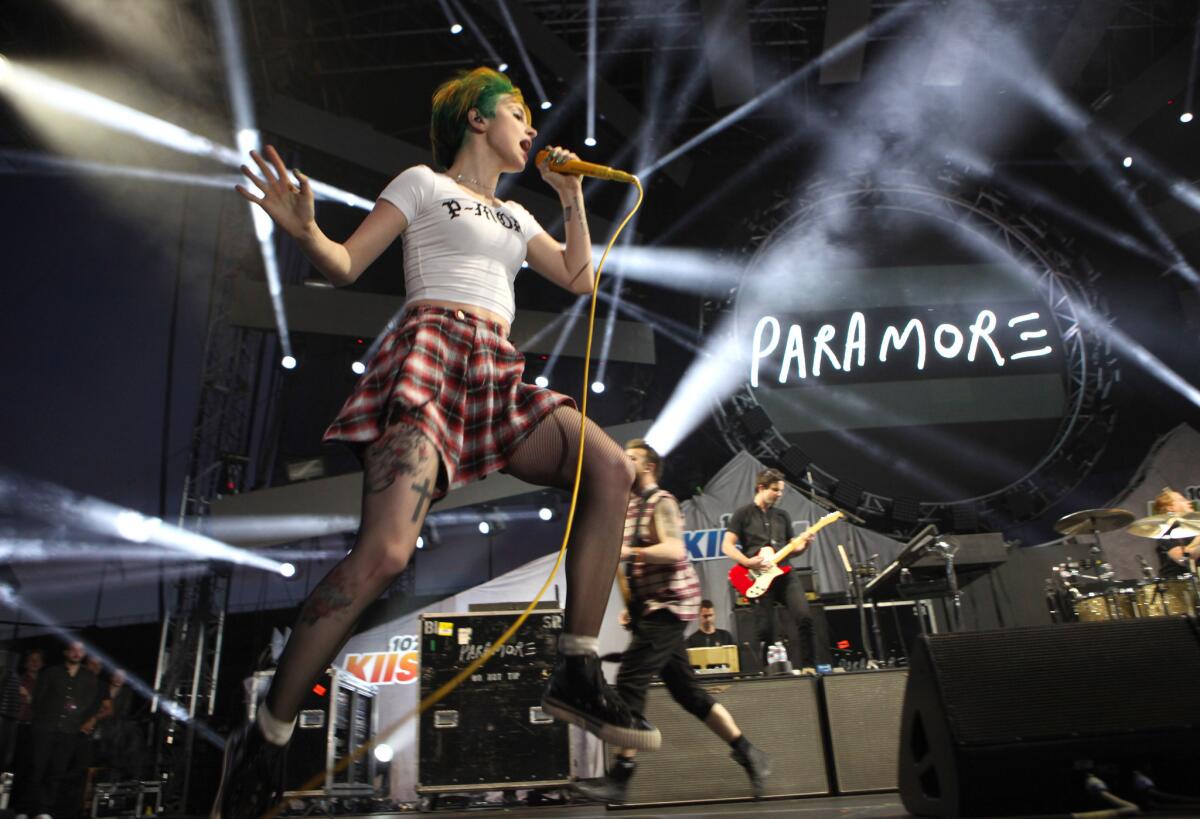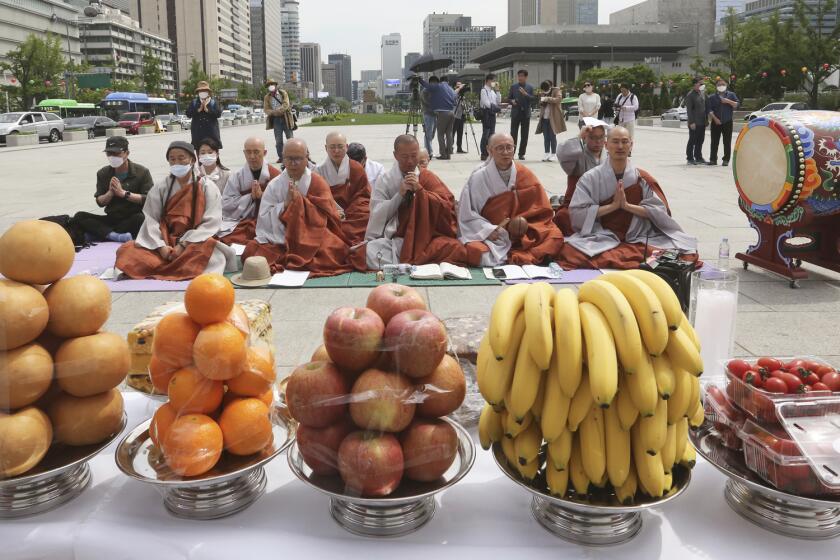The hard-won liberation of Hayley Williams: ‘It wasn’t beautiful. It was painful’
Hayley Williams is perched on her sofa in Nashville, chatting about her debut solo album between cuddles with her goldendoodle, Alf. The Paramore frontwoman, 31, was supposed to be out excitedly doing promo for “Petals for Armor,” released on Friday. Instead, she’s settled at home for an indeterminate amount of time. “It’s so weird to sit out on my front porch, and no one’s around. It’s just a desolate wasteland,” she says via Skype.
For Williams, the pandemic has been a roller coaster. Some days, she’ll cook or bake, or work on her music, and feel somewhat productive. She’s found some temporary escape in the dopey new musical from the “Bachelor” franchise, “Listen to Your Heart.” But, she says, “There are days that I literally haven’t gotten out of bed, and I felt like, ‘Oh my God, my depression is back in full swing.”
With concerts cancelled and album releases amiss, musicians with mental health issues are struggling with the stress and uncertainty from the COVID-19 pandemic.
Like so many, right now, Williams struggles with the loneliness of isolation, except she has a potentially career-defining album about to drop whose fate has been made impossibly uncertain by the coronavirus. “I’ve made peace with it,” she says of her LP release. “I’m actually super pumped. I’m a fan of [R&B singer] Kehlani, and she has an album coming out this week too. People are putting out rad art during all this.”
Since 2004, Williams has led the band Paramore, one of the more intriguing, progressive and successful rock acts of the ’00s and ’10s. At a moment of limited imagination among their emo peers, Williams and the rest of the band brought in dabs of R&B, ’80s pop and country music without diluting the intensity of their live attack. What’s more, the power and flexibility of her singing made Williams a singular presence in pop-punk — practically Aretha Franklin compared to, say, the countless whiners and screechers around her.

And though she wrote with detailed specificity — always this particular woman, not just a woman in general — Williams’ gender further distinguished the group from the beginning: You didn’t love Paramore because it rocked harder than other Warped Tour acts (though it often did); you loved Paramore because it illuminated a range of experiences outside the mosh pit. In a male-dominated scene rife with misogyny, Williams became not just a rockstar but a role model, particularly revered by young women, some of whom went on to form their own bands.
Making a solo album was never exactly a part of Williams’ plans. After the release of Paramore’s fifth album, 2017’s “After Laughter,” and a subsequent tour, the singer and her band — co-songwriter and guitarist Taylor York and drummer Zac Farro — decided they needed some time off. Williams planned to work on her vegan and cruelty-free hair dye line, Good Dye Young, while York wanted to produce, and Farro aimed to focus on his band HalfNoise. (Bassist Jeremy Davis had left the band at the end of 2015.)
“My body was already in the rhythm of, “OK, I’m ready to be creative again,” she recalls. “But mentally and emotionally, I wasn’t prepared.” She was wrong. “The universe is a lot smarter than that, and even my body is wiser than that,” she laughs.

In January 2019, the beginning of the project began to emerge, though she didn’t know it yet. Williams had just moved her grandmother into a memory care rehabilitation facility after a traumatic accident when she connected with sometime Paramore bassist and friend Joey Howard. Howard had just gone through something similar, and what transpired from talking about their grief became “Leave It Alone,” the first song Williams penned for “Petals for Armor.” She wasn’t sure anyone would ever hear it. “It wasn’t until we finished the third or fourth song that it was like, Oh, yeah, this started months ago with ‘Leave It Alone,’” she recalls.
For a variety of reasons, the songs Williams crafted weren’t right for Paramore. “These stories are so personal, and I didn’t really want to give this to something that, to me, already has a legacy.” With Paramore, Williams no longer feels like they need to prove themselves. “When it’s time for us to write another record, we’ll come back stronger,” she says.
The Los Angeles Times will provide around-the-clock updates on COVID-19 from across Southern California and around the world.Tracking the coronavirus in California: latest numbers | Support our journalism with a subscriptionHave a question about coronavirus? Send us your questions here. | You also can sign up for our newsletterSee latest photo galleryCoronavirus updates for May 6 are here
For now, “Petals for Armor” is Williams’ focus. The title reflects the balance between toughness and softness that Williams says she’s struggled with throughout the last few years. “It’s been a hard lesson for me to learn because so much of my progress in life has been because I just toughed it out,” she says. But that stopped working for her. She had to overhaul her coping mechanisms and how she processed her emotions.
“I have a tendency to deny a lot of my own feelings and then I’ll go out in public on a stage or whatever and say the things to people that I would so desperately wish that I could do for myself,” she says. Williams wants kids to leave a Paramore show “feeling seen, heard and empowered.” “But that doesn’t mean that I’m walking offstage and going back to my dressing room feeling like a queen or something,” she says.
Through therapy — and specifically, a type of treatment called EMDR (eye movement desensitization and reprocessing) recommended during a retreat she attended — Williams has been able to process her emotions through visualizations.
For her, EMDR was a gateway to other forms of therapy that helped her with her PTSD, something she thought only war veterans and people who were sexually abused typically experienced. “I didn’t experience physical or sexual abuse firsthand, but I was around it and it’s been very prevalent throughout [my] generation,” she says. Then she realized there are things she was subconsciously affected by, “when we’re in the womb or when we grow up in that environment.”
“You couple that with some of the experiences I had in a pretty toxic relationship for 10 very formative years of my young womanhood” — referring to New Found Glory’s Chad Gilbert, whom she divorced in 2017 — “And I think that like there was just a lot of s— I did not know how to name.”
During one of her EMDR sessions — which she still continues to take part in — she saw what would become a source of inspiration for her album: flowers emerging from her body. “It wasn’t beautiful,” she recalls. “It was gruesome and painful.” She began to realize being soft and vulnerable was as powerful as all the top-of-her-lungs vocalizing she did on stage. “I think it’s more potent to be able to say your truth, bluntly and calmly, than to have to flail around and scream about it,” she says.

While Williams still struggles with depression and anxiety, she thought it was important for fans to be able to follow a story line on “Petals for Armor” and experience a character develop and progress, which is why she divided the album into three parts or EPs. “We want to be able to see our friends or loved ones go through something and come out the other end stronger,” she says. “That doesn’t mean perfect, but it just means a better version.”
For the album, that meant unearthing raw details of her relationship with Gilbert and sorting through her trauma. On the funk-tinged “Dead Horse,” Williams details their battles and the shame that paralyzed her. Williams admits to being the other woman at the beginning of their relationship and, by the end, the one being cheated on. “I made my bed, didn’t I?” Williams says.
Williams has since grown and gotten to know herself again. “I was just one big mismatch of a person, and I had a lot of good things I wanted to give. I had a lot of energy, but I had nothing for myself. Mostly, I had no real respect for myself because I wasn’t actually asking or demanding respect from people close to me,” she recalls.
When she was writing “Simmer,” the chilling lead single of “Petals for Armor,” Williams says that “the first thing that came to me was rage.” “Rage is a quiet thing” she sings, “You think that you’ve tamed it / But it’s just lying in wait.” Once she started letting it release, everything began unraveling. “My anger has been such a source of relief for me throughout my life,” she says. At the same time, the second verse of the song evolved into a more universal feeling of anger spurred by women close to her and the #MeToo movement. “Every woman in my family has experienced pretty horrific abuse at the hands of men,” she says.

Williams considers herself a “very lucky and rare case,” where she doesn’t have any “horror stories” with men. Still, she explains, “I had condoms thrown at me on stage all the time, and people would yell, ‘S—. You don’t take off your top.’” Williams wasn’t ready to let someone embarrass her like that, so she would rattle off a comeback. “My point every night on stage was to be tougher or better and quicker with it and spit farther,” she says.
The still-fiery lead singer is now in Nashville, divorced and doing something she hasn’t done in well over a decade: dating. While she hasn’t ventured onto Tinder or OkCupid, she is happy it works for other people. “I don’t plan to do that, but it makes me feel so much comfort when I hear people tell me that they met their partner on a dating app,” she says. She describes her own experiences with dating as “very self-sabotage,” but it’s something she’s continuing to work on in therapy. “I really have this deep desire to create a home with a partner, global warming and COVID-19 be damned. I would love to be a mom one day,” she says.
But life is largely on hold at the moment, and getting “Petals for Armor” into the arms of her fans — the ones who have been with her since Paramore’s inception — is her priority. She’s at home putting together a special digital concert for fans who bought tickets for her now-postponed tour.
While the livestream date isn’t set, Williams plans to play the guitar on stage for the first time since she was about 15 or 16. “It sounds disgusting,” she says, “but I crave that smell of being in a sweaty room with other human beings, when they’re all singing or crying or laughing and dancing. I really miss that right now.”
More to Read
The biggest entertainment stories
Get our big stories about Hollywood, film, television, music, arts, culture and more right in your inbox as soon as they publish.
You may occasionally receive promotional content from the Los Angeles Times.











